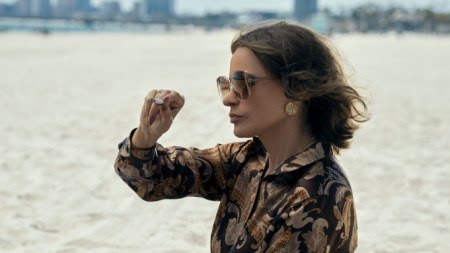CELEBRITY
‘Griselda’ Co-Creator and Sofía Vergara on Why the Netflix Series Doesn’t Cover the Cocaine Godmother’s Tragic Final Years

When viewers arrive at the end of Netflix’s new limited series “Griselda” — about the life and crimes of feared drug lord Griselda Blanco — they might be surprised to learn there is a lot more to the story.
The series doesn’t follow Griselda into her post-prison twilight years. Instead, it ends with the so-called Cocaine Godmother of Miami on the worst day of her life –– a scene that tested Sofía Vergara, the woman playing her.
“It was very emotional for me,” Vergara tells Variety of filming the sixth and final episode. “But I think with the help of [series director Andrés Baiz], I was able to tap into the things that, from the very beginning, made me believe that I could play her.”
In the finale, Griselda is arrested in California and sentenced to 15 years in a federal prison for owning and operating a Miami cocaine empire that rivaled any other operation in North and South America. But that is by far the least traumatic thing to happen in the final 10 minutes. First, it is implied that from behind bars Griselda has her estranged third husband Darío (Alberto Guerra) killed so she can reunite their son Michael with his half-brothers, her other three sons. When all four boys visit her in prison, she promises that, when she is out, they will all be a family again.
Cut to seven years later when former Detective June Hawkins (Juliana Aidén Martinez) visits Griselda with news that her three older sons have all been murdered, a methodical and gutting message sent by her enemies. Only Michael survives back in his mother’s native Medellín with his paternal grandmother. Devastated, Griselda goes back to her cell and retreats into the memory of the day she spent at the beach with her boys right before her arrest. That’s when a short-and-sweet epilogue reveals she was eventually released from prison, returned to Medellín and was assassinated in 2012 at the age of 69.
The epilogue puts an upsetting exclamation point on the end of a life viewers have just spent six hours watching. And it doesn’t mention that the real Griselda married for a fourth time, and lived near Michael and his wife until her death.
So why did the series cut her story short? Co-creator and executive producer Eric Newman says there was a good reason, and it all goes back to the foundational relationship between Griselda and her sons that opened the series.
“We had to show this is someone who cared about her children,” he says. “So for us, I think the real loss is not her death many years later. It is the loss of the very thing she was trying to protect. Or that she thought she was trying to protect. You know, we are all heroes in our own story, and she’s got an explanation –– not necessarily an excuse but an explanation –– for why she did what she did. But that is where the loss really hurts.”
“And we only had six episodes!” Vergara says.
There is certainly an irony to centering this take on Griselda’s life around her relationship with her children. Protecting her sons is a constant refrain from Griselda, something she even repeats in the finale. But Vergara says it became evident they were not her top priority in the end.
“There were decisions that she made that you can clearly see were not for them,” she says. “It was for her and her ego. She started acting like the men she was competing with. I think all her insecurities as a woman made her think she needed to kill more, be more violent and be more crazy than them to be at their level. But you see that she is doing all of that for herself.”
The series was shot almost entirely in sequence, giving Vergara the chance to show Griselda’s evolution from a resourceful mother to a titan of industry. Getting the full breadth of her journey made it possible for the Emmy-nominated actress to feel the weight of those crushing final moments. But Vergara was also able to draw from her own personal experience with the cost of the drug trade.
“I had to tap into a lot of stuff from my life for those final episodes,” says Vergara, who also serves as an executive producer. “I grew up in Colombia during that era. My brother was unfortunately part of that business, and was killed in the ‘90s. I know what narco traffic does to your family, what it does to even the person who is part of that business. I understand it, I felt it.”
The role, which required extensive prosthetics, took a toll on Vergara by the end of production. She specifically points to Episode 5, when Griselda’s deepening addiction to crack cocaine spirals out of control and pushes away Darío and her inner circle.
“I really couldn’t sleep anymore,” Vergara adds. “It was something — because I have never done anything in Spanish or a drama or anything with prosthetics, so I was kind of exhausted and confused and nervous. I think all of those ingredients helped me at the end, because everything is so emotional for Griselda, you know?”
As the series closed the book on its iteration of Griselda, Newman, who also served as the showrunner for “Narcos” and “Narcos: Mexico,” says they never wanted to soften the blow of her actions, nor did they want to dismiss her as a formulaic monster.










